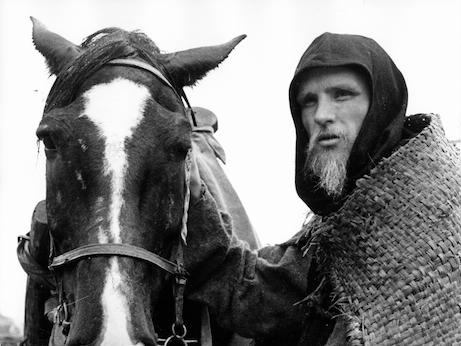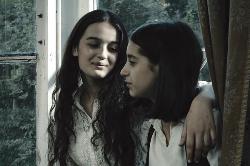 Tarkovsky’s epic film uses the legend of Russia’s great icon painter to explore urgent questions of art, faith, and suffering.
Tarkovsky’s epic film uses the legend of Russia’s great icon painter to explore urgent questions of art, faith, and suffering.
On any film buff’s short list of great Russian directors you’re bound to see the name of Andrei Tarkovsky, who directed seven brilliant and challenging films between 1961 and his death in 1986. After startling the world with his searing anti-war drama Ivan’s Childhood, Tarkovsky took six years to fashion his second film, and my personal favorite among his works, the three-and-a-half hour epic from 1969, Andrei Rublev.
The film consists of ten sections, each one dramatizing a different phase in the life of the great 15th century icon painter Andrei Rublev, played by Anatoli Solenitsyn. Very little is known about the actual Rublev—Tarkovksy just uses this legendary figure to portray some of his great themes, including the artist’s mission in a fallen world, and the perennial struggle between faith and doubt, compassion and cruelty. The picture also traces a progression of literary form. It begins in the odd, mythic style of a folktale, and then proceeds from lyric poetry through stark tragedy, to a kind of realism, and then finally a vibrant modernism. The unrolling of the story presents a panorama of medieval Russian life that also reflects 20th century concerns. Rublev witnesses the contrast between the cerebral order and repression of the Church and a pagan group that celebrates the passions of the flesh. His collaboration with an Orthodox artist painting a new church prompts a theological dialogue that becomes more urgent when the Tatar armies invade, causing unbelievable suffering and carnage in their wake. Rublev’s inner conflict between compassion for the people and revulsion at their behavior becomes the movie’s central test of faith.
Breathtakingly ambitious and visually stunning, Andrei Rublev is too rich to describe adequately in the time I have. Like a modern Dante, Tarkovsky takes us on an unforgettable journey, from the heights of religious ecstasy to the depths of hell. And also like Dante, the artist becomes a mirror for the endless human struggle—psychological, political, and spiritual. The last episode, involving the casting of a giant bell for a cathedral, with a half-crazed boy leading the effort, sums up the movie’s complex view of faith and endurance, the beautiful black-and-white film ending in a brief explosion of color.
The Soviet government didn’t take too kindly to this film, which argues against the way of fear and punishment and in favor of kindness and Christian love. Its release was delayed for two years while the censors made cuts. They’ve since, of course, been restored. The titanic masterpiece Andrei Rublev is available in all its glory, on Blu Ray and DVD.

Bo Burnham’s story of a 13-year-old girl stuck in that weird time in between childhood and adolescence is remarkably compassionate and clear-sighted. There are...

A little miracle has come out of Georgia, the former Soviet republic. It’s a film called In Bloom, written by Nana Ekvtimishvili, and directed...

The well-crafted drama Mother of George takes place in one of those small communities from overseas transplanted into urban American society, in this case...